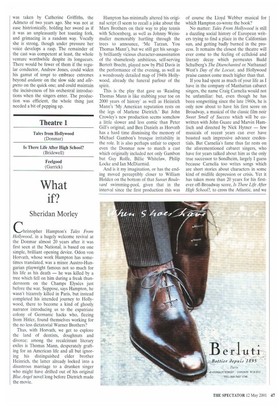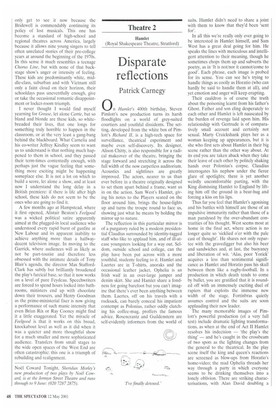What if?
Sheridan Morley
Christopher Hampton's Tales From Hollywood, in a hugely welcome revival at the Donmar almost 20 years after it was first seen at the National, is based on one simple, brilliant opening device. Odon von Horvath, whose work Hampton has sometimes translated, was a minor Austro-Hungarian playwright famous not so much for his life as his death — he was killed by a tree which fell on him during a freak thunderstorm on the Champs Elysees just before the war. Suppose, says Hampton, he wasn't bizarrely killed in Paris, but instead completed his intended journey to Hollywood, there to become a kind of ghostly narrator introducing us to the expatriate colony of Germanic hacks who, fleeing from Hitler, found themselves working for the no less dictatorial Warner Brothers?
Thus, with Horvath, we get to explore the land of dentists, doughnuts and divorce; among the recalcitrant literary exiles is Thomas Mann, desperately grafting for an American life and all but ignoring his distinguished elder brother Heinrich, the latter already locked into a disastrous marriage to a drunken singer who might have drifted out of his original Blue Angel novel long before Dietrich made the movie. Hampton has. minimally altered his original script (I seem to recall a joke about the Marx Brothers on their way to play tennis with Schoenberg, as well as Johnny Weissmuller memorably hurtling through the trees to announce, 'Me Tarzan, You Thomas Mann'), but we still get his savagely brilliantly vicious character-assassination of the shamelessly ambitious, self-serving Bertolt Brecht, played now by Phil Davis in the performance of the evening, as well as a wondrously detailed map of 1940s Hollywood, already the funeral parlour of the spirit.
This is the play that gave us 'Reading Thomas Mann is like stubbing your toe on 2000 years of history' as well as Heinrich Mann's 'My American reputation rests on the legs of Marlene Dietrich.' But John Crowley's new production seems somehow a little slower and less comic than Peter Gill's original, and Ben Daniels as Horvath has a hard time dismissing the memory of Michael Gambon's brusque irritability in the role. It is also perhaps unfair to expect even the Donmar now to match a cast which originally included not only Gambon but Guy Rolfe, Billie Whitelaw, Philip Locke and Ian McDiarmid.
And is it my imagination, or has the ending moved perceptibly closer to William Holden on the bottom of that Sunset Boulevard swimming-pool, given that in the interval since the first production this was of course the Lloyd Webber musical for which Hampton co-wrote the book?
No matter: Tales From Hollywood is still a dazzling social history of European writers trying to find a place in the Californian sun, and getting badly burned in the process. It remains the closest the theatre will ever come to the feeling of celluloid and literary decay which permeates Budd Schulberg's The Disenchanted or Nathanael West's Day of the Locust. and Hollywood praise cannot come much higher than that.
If you had spent as much of your life as I have in the company of Manhattan cabaret singers, the name Craig Carnelia would not be unfamiliar; but, even though he has been songwriting since the late 1960s, he is only now about to have his first score on Broadway, a musical of the classic film noir Sweet Smell of Success which will be cowritten with John Guare and Marvin Hamlisch and directed by Nick Hytner — few musicals of recent years can ever have boasted such impressive advance credentials. But Carnelia's fame thus far rests on the aforementioned cabaret singers, who have for years talked about him as the only true successor to Sondheim, largely I guess because Carnelia too writes songs which are short stories about characters in some kind of midlife depression or crisis. Yet it has taken more than 20 years for his firstever off-Broadway score, Is There Life After High School?, to cross the Atlantic, and we
only get to see it now because the Bridewell is commendably continuing its policy of lost musicals. This one has become a standard of high-school and regional theatres across America, largely because it allows nine young singers to tell often unrelated stories of their pre-college years at around the beginning of the 1970s. In this sense it much resembles a teenage Chorus Line, but with none of that backstage show's anger or intensity of feeling. These kids are predominantly white, middle-class, suburban and with Vietnam still only a faint cloud on their horizon, their schooldays pass uneventfully enough, give or take the occasional romantic disappointment or locker-room triumph.
I never thought I would find myself yearning for Grease, let alone Carrie, but so bland and blonde are these kids, so whitebreaded their lives, that one longs for something truly horrible to happen in the classroom, or at the very least a gang-bang behind the blackboard. What Carnelia and his co-writer Jeffrey Kindley seem to want us to understand is that nothing much happened to them in school, and they passed their term-times contentedly enough, with perhaps just the vague feeling that something more exciting might be happening someplace else. It is not a lot on which to build a score, let alone a show, and at least now I understand the long delay in a British premiere: if there is life after high school, these kids do not seem to be the ones who are going to find it.
A few months ago at Hampstead, where it first opened, Alistair Beaton's Feelgood was a wicked political satire apparently aimed at the plugged-in local audience who understood every rapid burst of gunfire at New Labour and its apparent inability to achieve anything more than a halfwaydecent television image. In moving to the Garrick, where audiences will as likely as not be part-tourist and therefore less obsessed with the intimate details of Tony Blair's agenda, the director Max StaffordClark has subtly but brilliantly broadened the play's farcical base, so that it now works on a level of pure Feydeau. Speechwriters are forced to spend hours locked into bathrooms, ministers end up with chocolate down their trousers, and Henry Goodman as the prime-ministerial fixer is now giving a performance of such manic intensity that even Brian Rix or Ray Cooney might find it a little exaggerated. Yet the miracle of Feelgood is that it works on this broad, knockabout level as well as it did when it was a quieter and more thoughtful show for a much smaller and more sophisticated audience. Transfers from small stages to the wide open spaces of the West End are often catastrophic: this one is a triumph of rebuilding and realignment.
Noel Coward Tonight, Sheridan Morley's new production of two plays by Noel Coward, is at the Jermyn Street Theatre and runs through to 9 June: (020 7287 2875).



































































 Previous page
Previous page